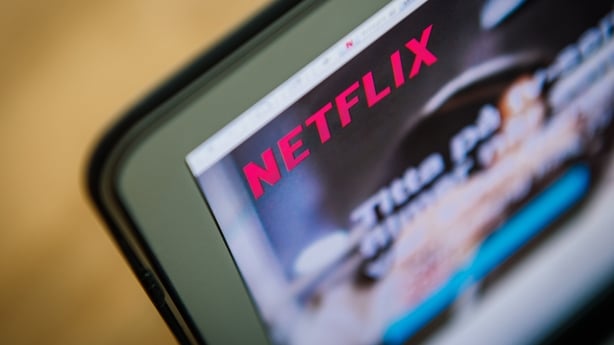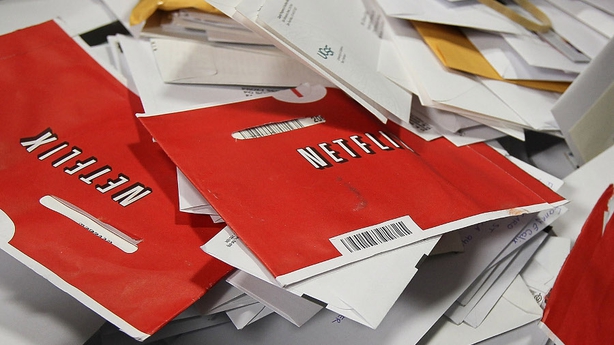Netflix beat Wall Street estimates for the first quarter but offered a lighter-than-expected forecast last night, demonstrating the challenges the mature streaming service faces in its pursuit of growth.
Netflix said it shifted a wider launch of a plan to crack down on unsanctioned password sharing into the second quarter to make improvements, delaying some financial benefits.
But it added it was pleased with results so far.
As the streaming video pioneer faces signs of market saturation, it is looking to new ways to make money, such as the password crackdown and a new ad-supported service.
Revenue and earnings for the first quarter came in roughly in line with the average analyst estimates from Refinitiv. Earnings per share hit $2.88 with revenue of $8.162 billion.
"We are growing and we are profitable," co-chief executive Ted Sarandos said in the company's post-earnings video interview. "We have a clear path to accelerate growth in both revenue and profit, and we're executing it."
Shares of Netflix dropped as much as 11% in after-hours trade following the report but recovered to gain 1.4%.
Netflix serves as a bellwether for the streaming industry, in which growth has slowed as competition has intensified.
From January to March, Netflix added 1.75 million streaming subscribers, missing analyst estimates of 2.06 million additions.
Analyst Paolo Pescatore of PP Foresight described the first- quarter results as mixed.
"Netflix is a mature business reinforcing less reliance on subscriber growth. However, this metric still moves the needle for key stakeholders," he said.
The company began rolling out its solution for password-sharing - offering a "paid sharing" option - in 12 countries in February but is delaying expansion.
"We believe it will result in a better outcome for our members and our business," the company said.
Netflix also said it was "on track to meet our full year 2023 financial objectives."
The clampdown on password sharing will begin in the US during the current quarter, it said.
For April to June, the company forecast $8.242 billion in revenue and $2.86 in diluted EPS. Wall Street had been projecting $8.476 billion for revenue and $3.05 for diluted EPS.

Netflix also is moving into live streaming. The company angered fans of dating show "Love is Blind" on Sunday when a reunion special that was meant to be shown live was unavailable.
The mishap was due to a "bug" that has been fixed, co-CEO Greg Peters said last night.
A year ago, Netflix lost 200,000 subscribers - its first subscriber decline in more than a decade, sending its stock reeling and resetting Wall Street's expectations for the sector.
Netflix added nearly 9 million subscribers in 2022, half as many as the 18 million gained in the prior year, with much of that growth coming from Asia, notes research firm MoffettNathanson.
The gains it made in Asia and Latin America have impacted the average revenue per user, spurring Netflix to make changes to its business model, the firm said.
The company introduced a lower-priced version of its service with ads in 12 countries in the fourth quarter.
UBS media analyst John Hodulik wrote that the password-sharing crackdown could well fuel Netflix's nascent advertising business, as it drives these "sharers" to the lower-priced version of the service.
Sarandos said Netflix hopes Hollywood studios can reach a "fair and equitable" deal with writers to avoid a strike, but he also noted the company has access to programming from around the world that it can offer if US-based production is disrupted.

Netflix to end DVD-by-post business
Netflix said it plans to wind down its DVD-by-post business, ending the service it started around 25 years ago.
The company said its DVD rental business had been shrinking and it will not be able to continue to offer quality service. Netflix will ship the last discs on September 29.
"Those iconic red envelopes changed the way people watched shows and movies at home - and they paved the way for the shift to streaming," Netflix Co-CEO Ted Sarandos said in a blog post announcing the DVD service had entered its "final season."
Netflix co-founder Marc Randolph described in his autobiography how he and co-founder Reed Hastings had flirted with the idea of challenging Blockbuster Video with mail-order VHS cassettes, but it would have cost too much.
They instead landed on a more cost-effective proposition: DVDs sold and rented online.
It was a calculated risk that the nascent DVD player, which went on sale for the first time in the US in 1997, would catch on with the consumer.
The service launched in 1998 with fewer than 1,000 titles, according to Randolph's account.
"Betting on DVDs was a risk," Randolph wrote in his book, "That Will Never Work: The Birth of Netflix and the Amazing Life of an Idea." He added: "But it might also be our way to finally crack that category."
It was the first time Netflix's gamble on an emerging technology allowed it to challenge an entrenched competitor. Rival Blockbuster filed for bankruptcy in 2010.
"From the beginning, our members loved the choice and control that direct-to-consumer entertainment offered," wrote Sarandos.
When Netflix attempted in 2011 to split its DVD rental business from online streaming into a separate service called Qwikster, it provoked howls of protest from consumers. The plan was ultimately scrapped.
After an incredible 25 year run, we've decided to wind down https://t.co/6h2lrcGg2b later this year.
— Netflix (@netflix) April 18, 2023
To everyone who ever added a DVD to their queue or waited by the mailbox for a red envelope to arrive: Thank you! https://t.co/McxJUlLlGF pic.twitter.com/nBXzgvvv7p

